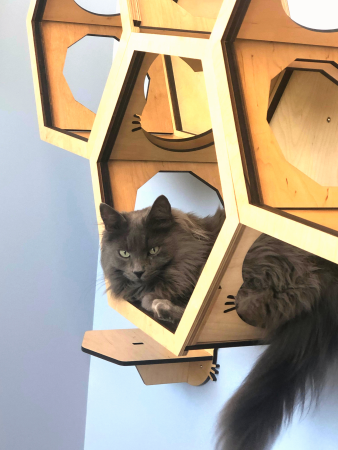How can preventive care extend the life and improve the health of my cat?
Cats are experts at hiding illness and pain (read more about that here), so there could be physical and/or internal changes that can only be detected by a veterinarian at a wellness exam. We want to catch changes to your cat's health as soon as we can to ensure that any new issues are addressed promptly & effectively. We believe that comprehensive cat preventative health care - vaccines, parasite prevention, proper diet & exercise, and dental care - are crucial to providing the best possible life for your kitty!

What types of preventive care do you recommend for cats?
- Nutrition and Weight Management: It's important to help your kitty maintain a healthy cat weight. At your cat's annual exam, your vet will perform a Body Condition Score and get an updated weight, which will allow them to make any recommendations on diet, weight loss, and exercise based on your kitty's breed, age, and overall lifestyle. All of our doctors recommend against grain-free diets, as they have been linked to heart disease.
- Vaccinations: Your vet will recommend a vaccination regimen that is compatible with your cat's lifestyle. A Rabies vaccine is recommended for all cats and your kitty will need to have had at least one Rabies vaccine in their lifetime in order to be seen by our office. We also recommend all cats be up to date on their RCP vaccine (full name Feline Rhinotracheitis-Calicivirus-Panleukopenia). If your kitty spends time outdoors, we recommend they have a Feline Leukemia vaccine yearly to protect them, as this disease is passed from infected cats and has no cure.
- Dental Care: Our doctors check your cat's mouth at their annual exam to determine the health of their mouth. Cat's are experts at hiding pain, so this allows us to catch anything that you may not see day-to-day! We do recommend brushing a cat's teeth regularly as the gold standard of dental care - however, we know as well as anyone how difficult this can be, so your vet can also recommend alternatives to promote your kitty's dental health.
- Spaying and neutering: Our office sees spaying & neutering as a cornerstone in responsible cat ownership. While not required by law, spaying female cats & neutering male cats protects them from preventable (and potentially lethal) diseases & behaviors. Spaying reduces female cat's chance of breast cancer. Females can also become pregnant starting at 6 months of age. Neutering male cats reduces aggression, the desire to roam, urinary marking, and the chance testicular cancer.
- Preventing fleas, ticks, and other parasites: We recommend parasite prevention for all cats, whether they are indoor or outdoor. In Santa Barbara's temperate climate, flea, tick, & mosquito season is year round, so having your kitty on a monthly preventative that protects them from these parasites reduces their risk of receiving a parasite-transmitted disease. Even if your cat is indoor only, these pests can be brought in from the outside or your kitty could potentially dart out the door, so the safest option is to keep them protected.
- Enrichment: Mental stimulation is a pivotal component of helping your cat life a long & healthy life! By providing necessary enrichment for your cat, you are more likely to prevent behavioral issues, such as eliminating outside of the litterbox, destruction of furniture, and general anxiety (just to name a few.) Annual wellness exams allow your doctor to review any new behaviors that your kitty is exhibiting and (if they aren't linked to a medical issue) give recommendations on what enrichment may help alleviate these behaviors. For example, vomiting while eating may be a result of consuming food too quickly, so a puzzle feeder or slow feeder may help eliminate this behavior while also tapping into their problem-solving skills!
- Senior Cat Care: As cats age, they become more susceptible to kidney disease, dental disease, and arthritis - among other issues - so annual wellness visits play a pivotal role in ensuring your senior cat continues to live a happy & comfortable life. A cat is considered a senior starting at the age of 10 years old. They can be plenty of health related issues that your kitty could be experiencing that are not something you are trained to see, which is why having them seen yearly by their doctor is important.

What are some possible conditions that can be avoided with cat preventive care?
Keeping you cat up to date on a flea, tick, & heartworm preventative can keep them from developing intestinal parasites and lethal heart complications while also protecting against flea infestation. Maintaining a balanced diet & exercise/enrichment regimen can prevent your kitty becoming overweight - obesity can lead to heart, kidney, or liver disease, along with diabetes. Brushing your cat's teeth, feeding high-quality dental treats, and routine dental cleanings help to prevent dental disease, a condition that starts in the mouth but can expand to affect different organs.
Why is it important to avoid self diagnosing my cat?
It's no question that you know your cat best! However, your veterinarian has a vast amount of specialized knowledge regarding optimal cat health & wellness and they have a relationship with your cat in particular. They can use this knowledge while examining your cat and considering the medical history you've provided to determine what could be ailing your kitty. Although the internet is a great resource, it's nothing in comparison to one-on-one time between your cat, your vet, and your vet's wealth of knowledge & experience.
What are the risks of failing to provide preventive care for my cat?
Considering everything that we've discussed above, irregular wellness & preventative care means a higher chance of your cat developing new medical issues or diseases that we can only catch once it's too late. We consider preventative care the cornerstone of veterinary medicine, as it ensures your kitty gets to live their best life possible.
If you have questions on how to take care of a cat, give us a call. We’re always here for you!
